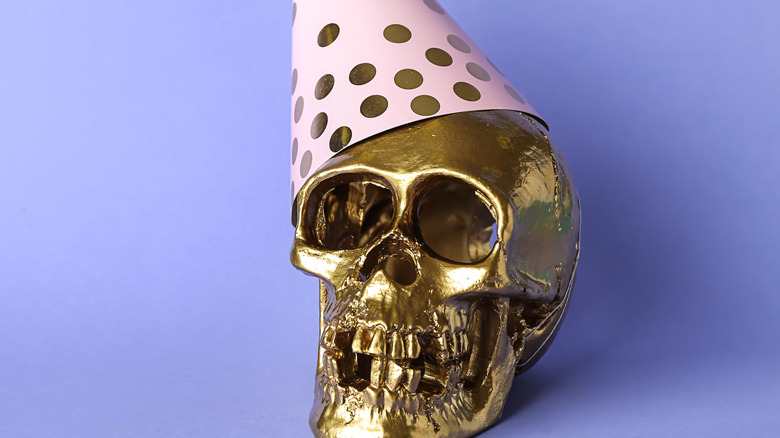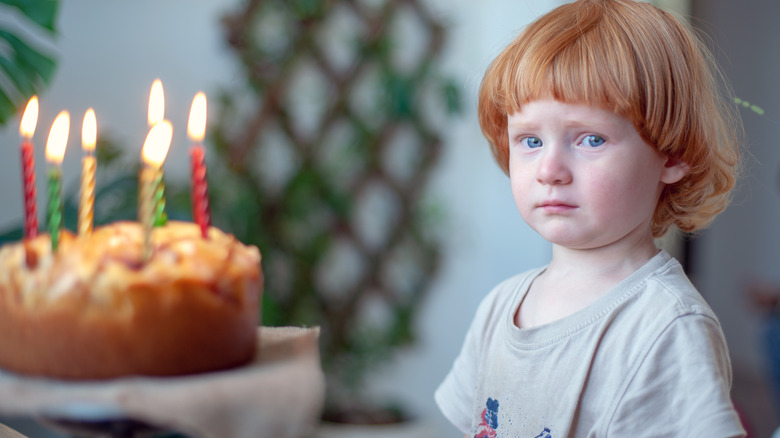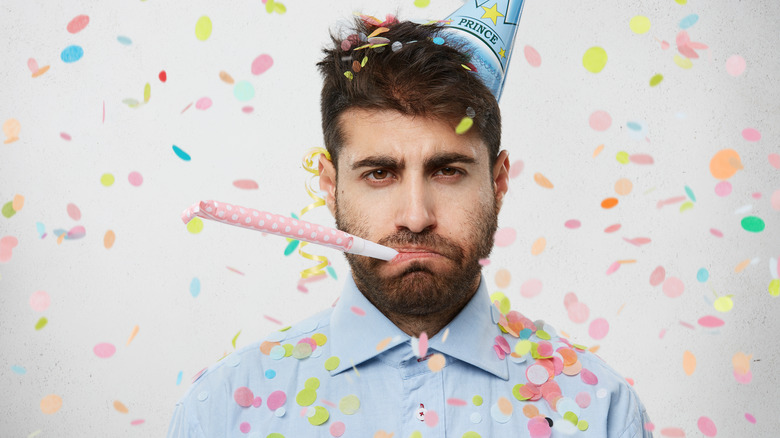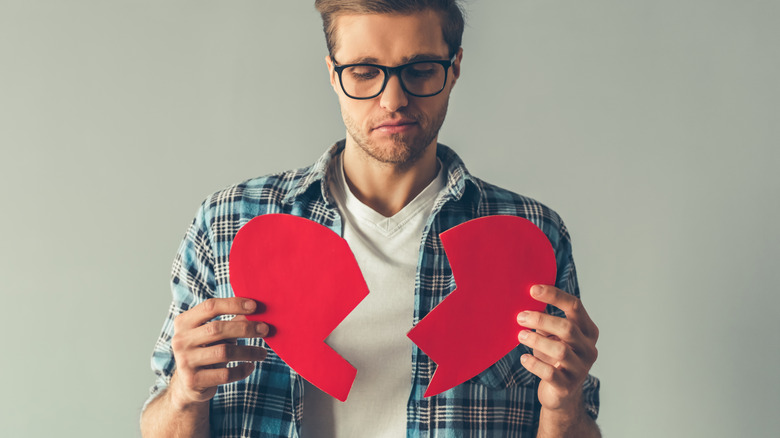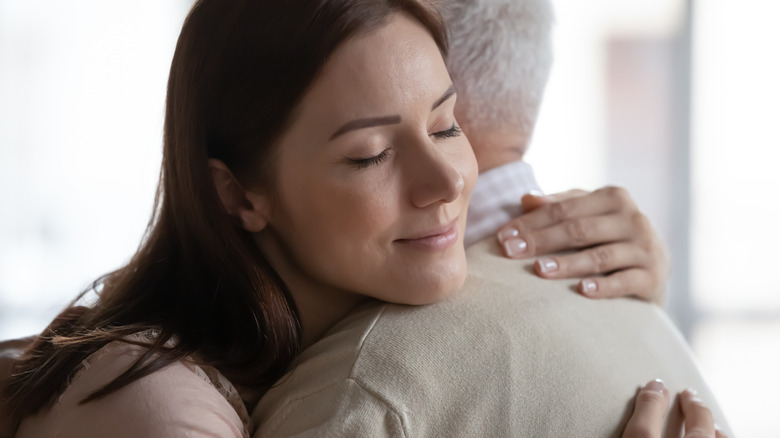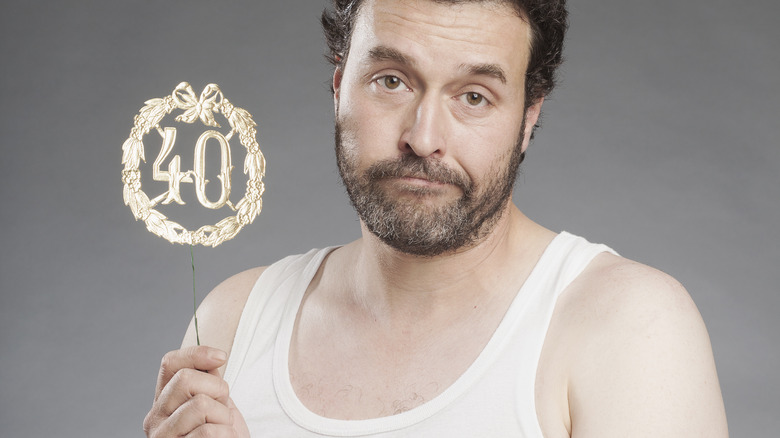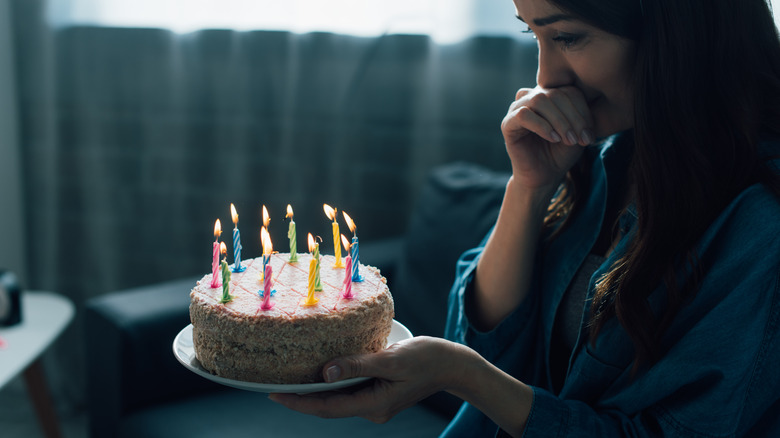Here's Why You're Likely To Die On Your Birthday
Death, it's said, is the great equalizer. It doesn't care how rich or poor you are, how bad or good, it comes for everyone at some point — and a lot of the time, it's violent, painful, and messy.
No one thought that a study on why you're super likely to die on your birthday was going to be a cheery one, right? The American Psychological Association says that mankind's awareness of our own inevitable death is called mortality salience, and it's a complicated thing. The idea is that awareness of our own death led to the development of and need to believe in something larger than ourselves, like organized religion. It's a way of measuring our actions, thoughts, and deeds to prove to ourselves that our lives have meaning, and it's called the terror management theory.
Fun stuff, right?
Also wrapped up in mortality salience is something called ontological confrontation, and that's basically the idea that certain circumstances or memories can suddenly run right up and smack you in the face with a reminder that, "Hey, you're going to die!" Most people build up psychological defenses against the knowledge we're all going to shuffle off the mortal coil — we have to, or we'd never get anything done. Some things break through those defenses, and here's where birthdays come in.
Now, let's talk about why these personal holidays might end up being deadly.
So, how likely are we talking?
In 2012, researchers from Switzerland, including members from the Psychiatric University Hospital and the University of Zurich, published the results of a study that looked at how likely people were to die on their birthday. They compiled and analyzed data from 1969 all the way up to 2008 and came to the conclusion that "In general, birthdays ... appear to end up in a lethal way more frequently than expected."
Yikes. By the time they were done going through the data, they found that people were 13.8% more likely to die on their birthday. They also saw a trend in causes. For women, it was likely due to a cerebrovascular or cardiovascular event, and strangely, there was also a higher-than-normal rate of deaths from things like cancer, too.
So, let's put this into perspective here: Just how big of a deal is a 13.8% increase in death rates? The Washington Post says that the Christmas-to-New Year's holiday season also sees a massive uptick in the death rate. One study that looked at deaths from 1988 to 2013 found that people were 4.2% more likely to die between Christmas and January 7, so birthdays are much, much worse.
This is extra true for one particular age group
In 2014, the University of Chicago released the results from another study (via The Washington Post), where they found a person was 6.7% more likely to die on their birthday. And that's just an average across all age groups — break that down, and it gets more interesting.
Once you're past 50, the likelihood starts going down. Aged 50 to 59 have a 13.16% chance, and that drops to 5.75% for the 60-to-69 age group. By the time a person reaches the ripe old age of 90, it's all the way down to 4.72%.
But here's the thing: Those between 20 and 29 are a whopping 25.39% more likely to die on their birthday, and when those birthdays fell on a weekend, that goes all the way up to 48.3%.
So, what's going on here? Study author Pablo Pena cites a likelihood of "risks associated with changes in behaviors on or around birthdays," and according to the American Psychological Association, there's a massive one that's seen a lot around a 21st birthday: binge drinking.
In 2008, the University of Missouri did a massive study that looked at drinking around 21st-birthday celebrations and found 24% of women and 34% of men said they had consumed more than 21 drinks on their birthday, with maximum numbers going well above that. The consequences of drinking that much in a short amount of time could absolutely cause a spike in a person's blood alcohol content that could be deadly.
What is the anniversary reaction?
The authors of the 2012 study from Switzerland suggest (via ScienceDirect) that the unusually high death rate is linked to something called the "anniversary reaction."
The U.S. Department of Veteran Affairs and the National Center for PTSD took a look at exactly what the anniversary reaction entails, and it can be devastating. It's essentially the experiencing of a series of symptoms — which include but aren't limited to depression, grief, panic attacks, exhaustion, feelings of guilt or shame, and even suicidal tendencies — around the anniversary of an event ... which is exactly what a birthday is.
Psychology Today says that birthdays serve to remind us that another year has gone by, that we're another year closer to death, and it's a time to reflect on all the things that we didn't get done. Again. It's particularly bad for those who are already dealing with trauma, who tend to look backwards with regret at a life they already see as pretty dreary.
The Awareness Centre says that the anniversary effect can be such a powerful thing that some psychologists are pushing to have it officially considered a form of PTSD, and in addition to birthdays, it can make it particularly difficult to deal with the birthday of a loved one who has passed, or other "anniversaries," from the death of a family member to the date of an assault, attack, or accident.
If you or someone you know is struggling with mental health, please contact the Crisis Text Line by texting HOME to 741741, call the National Alliance on Mental Illness helpline at 1-800-950-NAMI (6264), or visit the National Institute of Mental Health website.
Birthdays are stressful, and stress can be deadly
For the young, birthdays are fun. There's cake and presents, and parties with friends ... but mostly, it's the presents, right? Then there are milestone birthdays to look forward to — the birthdays when you can start driving, not to mention legally drink.
Then, it's all downhill from there.
NICS Well says that birthdays come with a certain amount of background stress: Sure, it's a celebration of the day a person came into the world, but there's also the stress of getting older and closer to the inevitable outcome. They suggest that the prevalence of cardiovascular-related deaths happen because of an acute increase of stress on birthdays, and yes, stressful days can be deadly.
Let's show how with another day. Researchers from the University of California at San Diego investigated how certain days can impact stress and consequently death rates by looking at the number 4. In Japanese and Chinese culture, the number is thought to be particularly unlucky, while Americans don't assign the same suspicion to it.
That gave them their experimental and control groups, and when they analyzed death dates between January 1973 and December 1998, they found that there was a spike in the deaths of Chinese and Japanese people on the 4th day of every month. Most of those deaths were attributed to chronic heart disease, and their verdict was that yes, the added stress of an unlucky day increased the likelihood of death.
Yes, a broken heart can be deadly
There are a lot of ways birthdays can go wrong. Milestones can be difficult to deal with, and that's just for starters. The first birthday without a parent, spouse, or a child? That can be devastating.
And yes, science has found that the stress, sadness, and grief caused by a broken heart can be deadly. According to NYC Surgical Associates director David Greuner, M.D. (via Women's Health), the feeling we describe as being heartbroken releases chemicals — like epinephrine and adrenaline — into the heart. It's basically your body gearing up for a fight-or-flight response, and if your heart gets a heavy dose of those chemicals in a short time, it can be catastrophic.
That's especially true when it's coupled with any other pre-existing heart conditions, which can be signaled by the presence of things like chest pain and difficulty breathing. Greuner says the perfect storm of factors "can lead the heart to give out because it's been overstimulated from being in an emotional state," and that's pretty much the definition of birthdays for a lot of people.
Extreme happiness can be deadly, too
It turns out that when birthdays go really well, that can be cause for concern, too.
The so-called "broken heart syndrome" is more properly called Takotsubo syndrome, or stress cardiomyopathy. The American Council on Science and Health says that when it happens, it's impossible to tell whether it's a heart attack or TTS — it's only the plaque buildup in the heart (or lack thereof) that indicates the final cause of death.
In 2016, the International Takotsubo Registry released some surprising findings (via The Washington Post). When they looked at 485 people who had suffered from the condition, they found that in 20 cases, the emotional trigger had been happiness. And yes, a birthday party was listed among the supposedly happy occasions.
This subset of the syndrome was called "happy heart," and there's a footnote to this, too. Happy or sad, people are overall about 27% more likely to have a cardiac episode of some kind on their birthdays. University Hospital Zurich cardiologist Christian Templin hypothesizes: "Perhaps both happy and sad life events, while inherently distinct, share final common pathways in the central nervous system output."
Humans have an annual rhythm that just might come to an end
Most people are familiar with the idea of a circadian rhythm: The National Institute of General Medical Sciences says it's the changes every human experiences in a 24-hour period. It's most noticeable in our sleep cycle, but that's just the beginning of what's going on inside us.
Research has found that literally everything in us — from organs to proteins to genes — has a biological clock that's run by a "master clock" called the suprachiasmatic nucleus. It's part of the hypothalamus, and it gathers information from the world we see around us to keep everything in sync.
What on Earth does this have to do with birthdays? Oxford Reference says that humans also come pre-programmed with circannual rhythm, and instead of 24 hours, it's a clock that goes through a yearly cycle. (A very visible example of animals that have circannual rhythms would be migratory birds, which use it to know exactly where they're supposed to be flying and when.)
Research from the National Academy of Medical Sciences of Ukraine found that not only are people more likely to die on their birthday, but they're also more likely to die during their birth month. That led to the hypothesis that "'birth stress' might be imprinted in a structure of the biological rhythms of the organism," which means that your body just kind of winds down and comes to a natural end as the year wraps up.
The death postponement hypothesis
The death postponement hypothesis says that "mind over matter" is a very real and very powerful thing, and here's how it ties into birthdays.
The Swiss study also found (via NBC News) that people who had cancer-related deaths showed a slightly different trend. They were about 10.8% more likely to die on their birthdays, but deaths remained high for the following day as well. It was the only cause of death that showed that particular pattern, and that led to the idea that death postponement might have something to do with it.
The idea behind death postponement is that people can hang on for just a little bit longer if they have a significant date, holiday, or event ahead of them. It sounds like a plot device to a completely unrealistic romantic drama, but according to research from the University of California, San Diego, it's not just possible; it's surprisingly common.
In order to study whether or not it was possible that someone could postpone dying until after a significant event, they looked at Chinese mortality rates around the Harvest Moon Festival. They found that yes, there was a dip in the number of deaths leading up the festival and then a peak afterward. The conclusion? People can postpone the inevitable if they want to see one more festival, holiday, or birthday.
Milestone birthdays come with an increased risk of suicide
Cambridge University statistician professor David Spiegelhalter told the BBC that when he reviewed the data, he came to one conclusion: "something on your birthday kills you."
Unfortunately, for some, birthdays come with a heavy burden.
According to the U.K.'s Centre for Suicide Prevention, research has shown that the approach of "socioculturally meaningful events" has been proven to influence a person's decision to commit suicide. That includes birthdays, both among the general population and in those who are under the supervision of a mental health care specialist. The findings were so significant that they suggested further research be done and healthcare professionals be trained in the apparent trend.
The research was supported by other studies, too. A study headed by the University of Tokyo found that in Japan, occurrences of suicide were highest on an individual's birthday, and there was an increased risk in the five days before and the week following the birthday. A study published in Scientific Reports went a step further and found that the risk was higher still when it was a milestone birthday, particularly at 20, 30, 40, and 60.
The reasoning they gave is that birthdays make a very distinct time for reflection, and — particularly when someone has no one to celebrate with — the effect of the so-called "birthday blues" can be devastating when combined with the sadness of celebrating a lifetime milestone alone.
If you or anyone you know is having suicidal thoughts, please call the National Suicide Prevention Lifeline at 1-800-273-TALK (8255).
There's a chance that the records are wrong ... maybe
Strangely, there's another theory that says there's absolutely nothing to see here at all, just move along please.
David Spiegelhalter is a Cambridge University statistician, and he told the BBC that at a glance, it definitely seems like there's something up based on the data that came out of the University of Zurich. But he says that looking closer, the findings are "compatible with a uniform 14% blip on all causes, all ages, both sexes." In other words, there's nothing here to be concerned about, and it's not a thing after all.
He went on to say that it's entirely possible the raw data they were basing their findings on was flawed to begin with. The study looked at the birth and death dates of 2.5 million people, and, he says, "it's 900 deaths in which people have been registered to have the same birth date as death date. That's not many out of 2.5 million."
Well then. Spiegelhalter goes on to say that it's entirely possible that in some of those cases, the death date was known, but the person's birth date wasn't — so whoever was entering the data simply duplicated the date. It's also possible that wrong boxes got filled in, and he adds that if just .04% of the death certificates were wrong, the apparent statistical likelihood of dying on your birthday disappears.
Here are some related statistics you can't un-know
So, let's talk about some other times you're most likely to die. In 2012, a study in the Annals of Neurology reported (via The Atlantic) that researchers had found a gene that sort of oversaw how our circadian rhythm works. When we're younger, we have schedules we need to adhere to that often interfere with what our body wants to do. Post-retirement, we can (if we're extremely lucky) just sort of do whatever we want. That's when our body's natural rhythm kicks in, and when the body is left to figure things out for itself, it turns out that it tends to wind down for good at the same time across our species: late morning, especially around 11 a.m.
Now, birthdays aside, let's talk about the deadliest days of the year. According to The Washington Post, sociology professor David Phillips compiled data from 57 million death certificates and found that people are most likely to die of natural causes on January 1. It's the peak of a trend that drops off as springtime approaches, remains low throughout the summer, and starts to rise toward that January 1 peak against around October. Why? Who knows!
Now, what about days of the week? It turns out that while Monday might seem like it's going to be the most miserable, when Live Science sifted through data from the Centers for Disease Control and Prevention, they found that the most common day to die was Saturday.
Famous people who died on their birthday
There are some fascinating tales of famous people who were born and died on the same date ... and it was such a big deal that for one, no one's sure what the exact date was.
William Shakespeare, says Mental Floss, died on the same day he was born. Historians have been debating over the precise date for a long time, but it's generally considered to be April 23 — and he died on his 52nd birthday.
Then, there's the gangster "Machine Gun" Kelly, who had a heart attack and died on July 18, 1954 — his 59th birthday. Ingrid Bergman died on her 67th birthday from complications following an operation for breast cancer, while the jazz musician Sidney Bechet died on his 62nd birthday. Gertrude Astor passed away after having a stroke on her 90th, says Vintage News, and Renaissance painter Raphael has this dubious honor, too. No one is quite sure why he died on his 37th birthday, but we do know why Grant Wood — the artist who painted American Gothic — died on his 51st birthday. He passed away after being diagnosed with pancreatic cancer.
